Abstract
The combination of nicotinamide and carbogen breathing is awaiting clinical evaluation as a strategy to overcome tumour hypoxia and thus enhance radiation response. We have continued our evaluation of this approach in the murine SCCVII tumour with the aim of determining the importance of nicotinamide dose and the pre-irradiation breathing time (PIBT) for carbogen. For carbogen breathing alone maximal enhancement of radiation response was observed with PIBT's of between 5 and 30 min. When nicotinamide (1,000 mg kg-1 IP) was administered 60 min prior to irradiation little or no variation in radiation response was observed for all the PIBT's examined (5-90 min). Indeed at all PIBT's the cell survival obtained for the carbogen nicotinamide and radiation combination was indistinguishable from that expected for a fully aerobic response. For PIBT's of 15 and 60 min we examined the influence of nicotinamide doses between 50 and 1,000 mg kg-1. Significant radiosensitizing effects were observed for all nicotinamide doses tested above 50 mg kg-1. Moreover for doses of 250 mg kg-1 and above the cell survival data was consistent with that expected for a fully aerobic response. No additional benefit accrued from raising the nicotinamide dose above 250 mg kg-1. These results indicate that significant radiosensitization may be expected even with clinically achievable nicotinamide doses when it is combined with carbogen breathing. Furthermore, the use of nicotinamide may reduce the critical importance of PIBT on the radiosensitization observed with carbogen.
Full text
PDF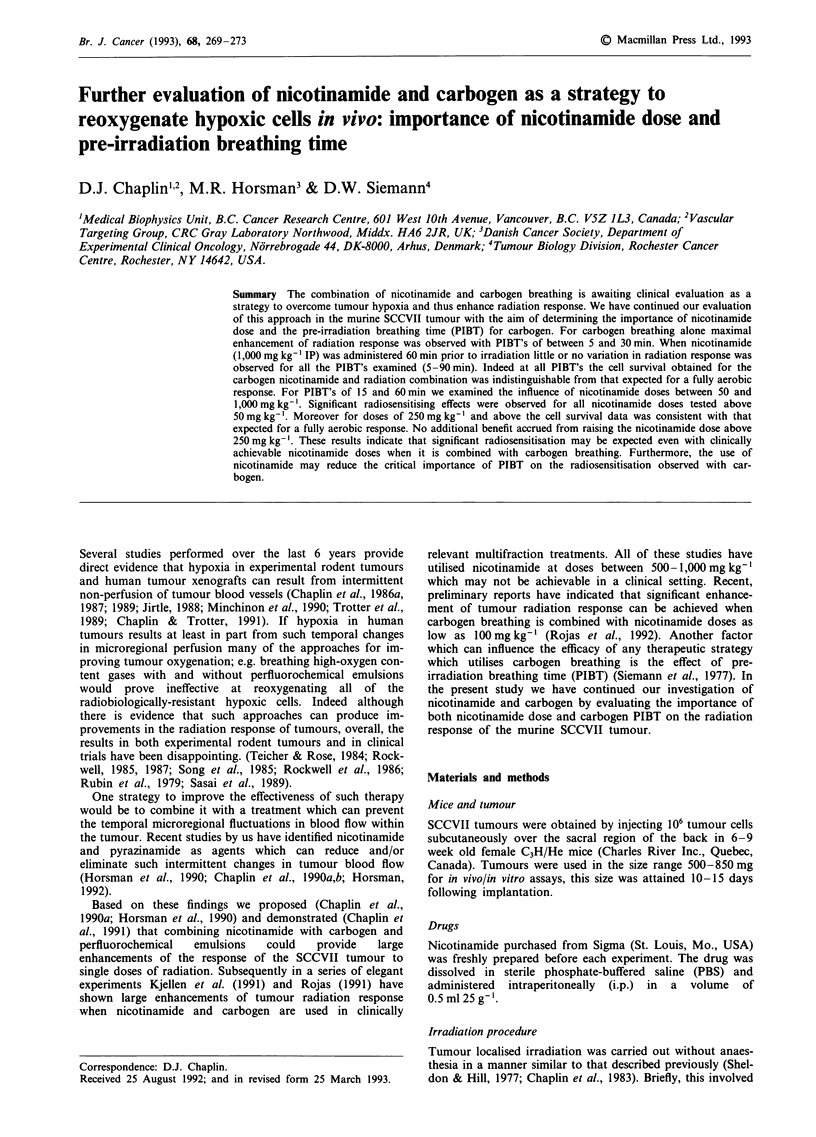
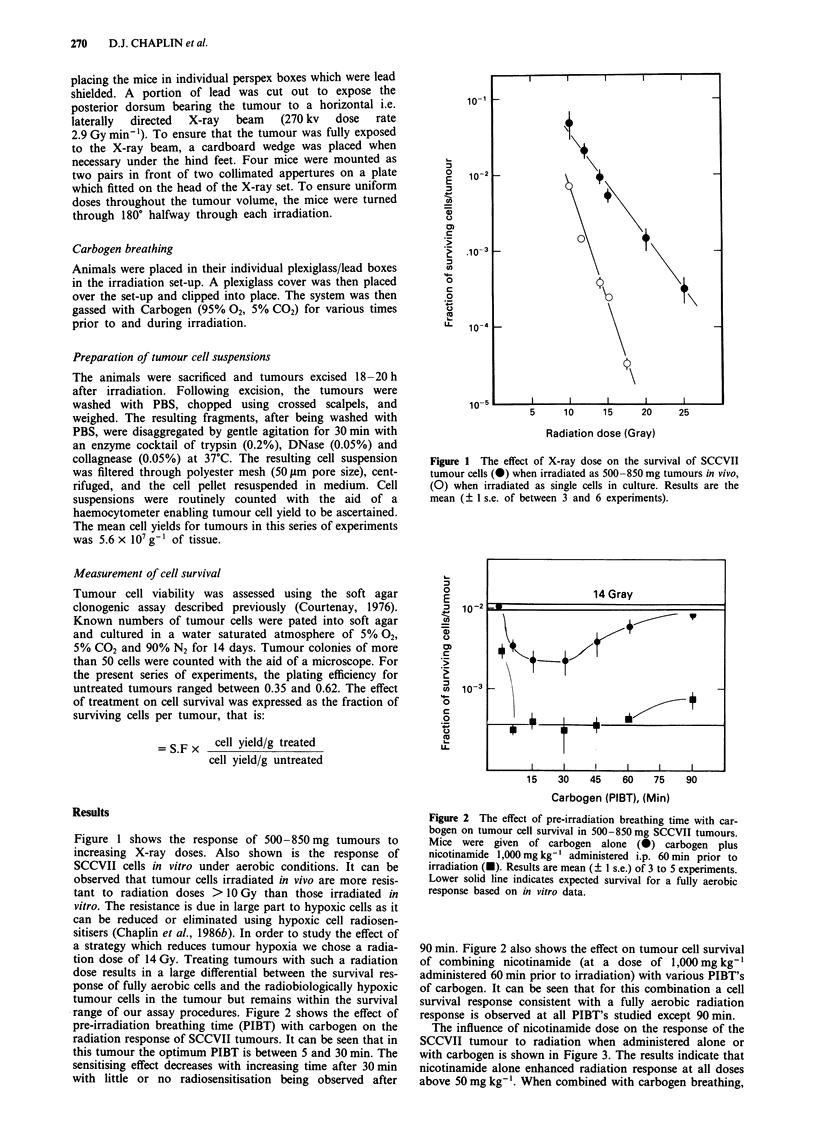
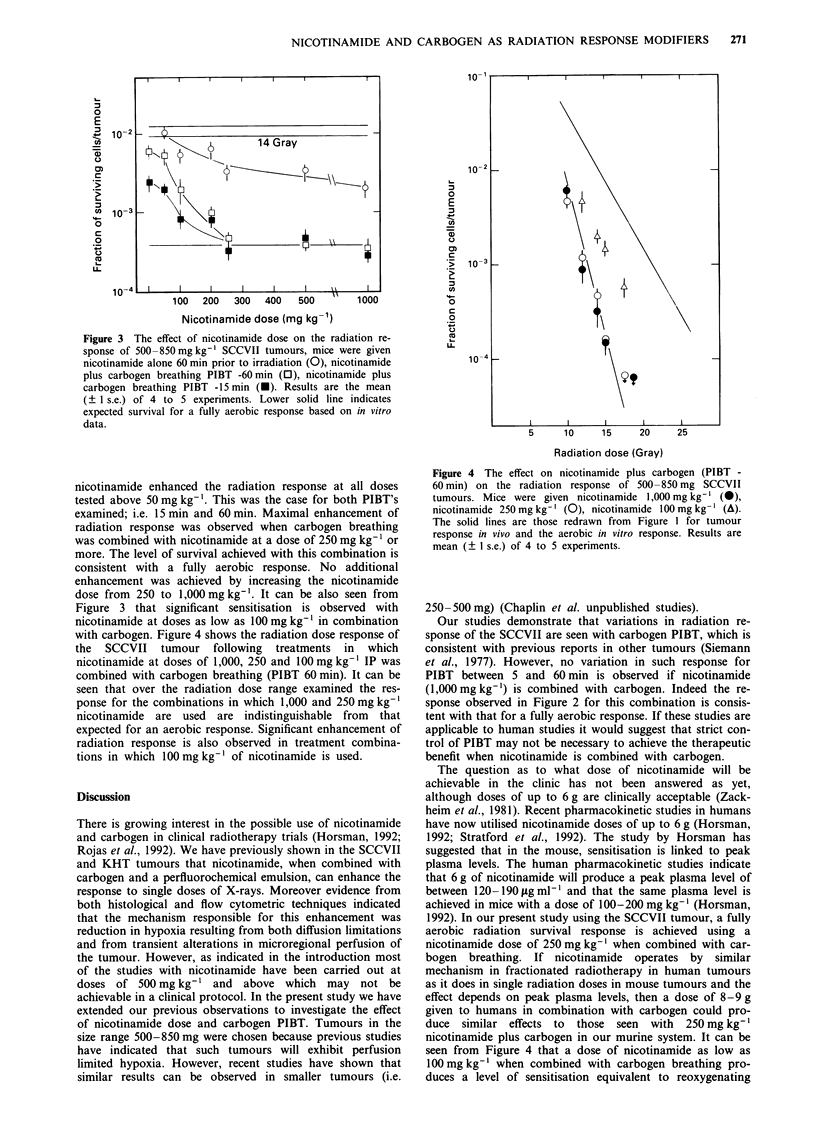
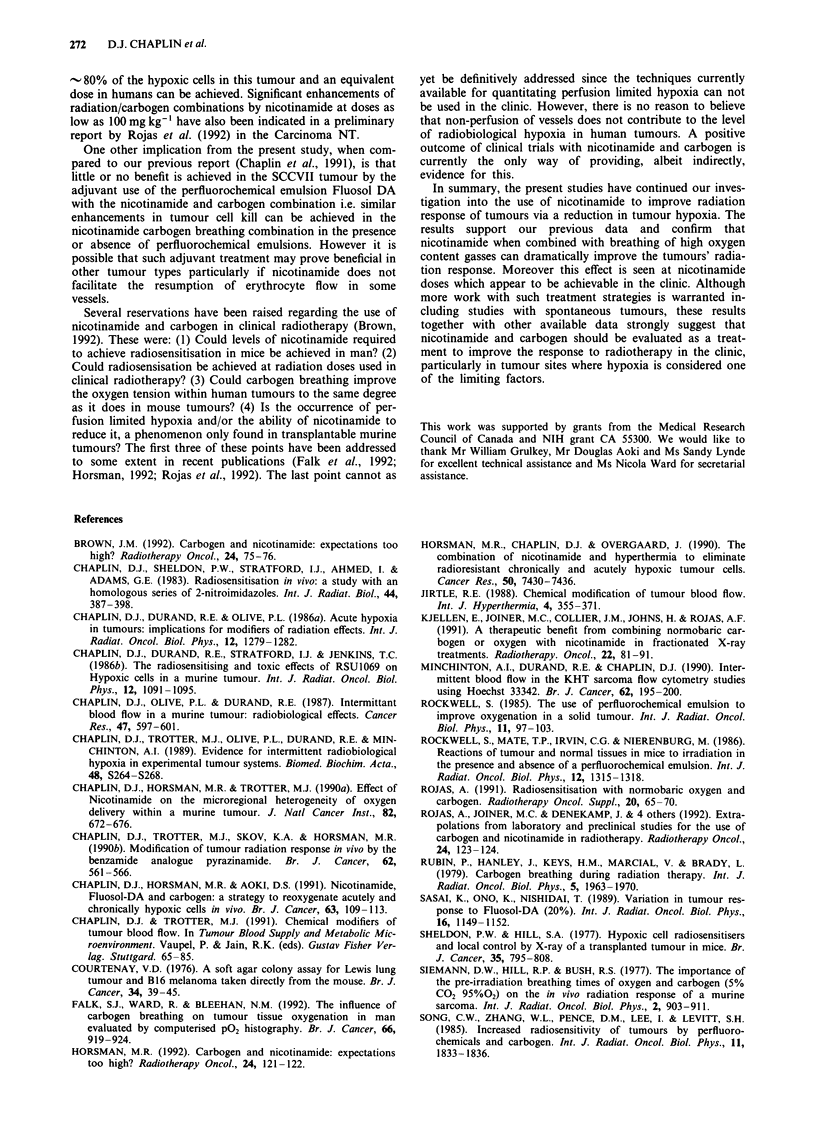
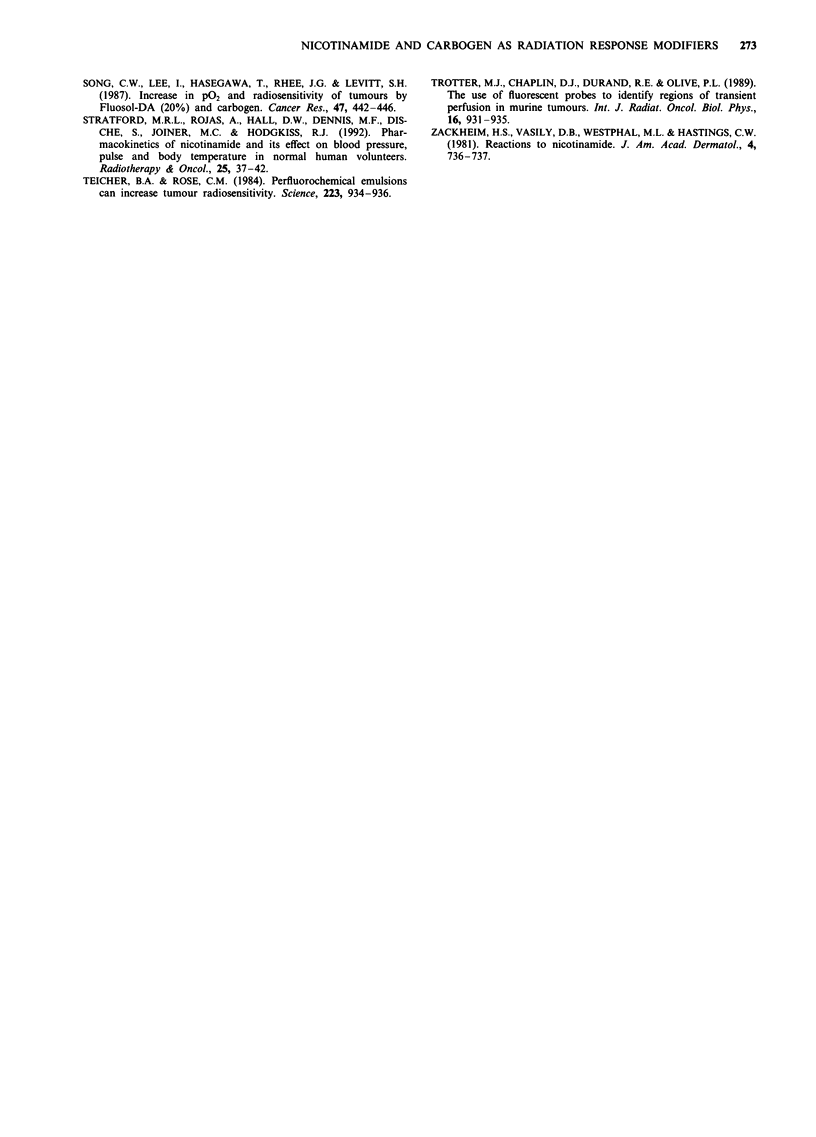
Selected References
These references are in PubMed. This may not be the complete list of references from this article.
- Brown J. M. Carbogen and nicotinamide: expectations too high? Radiother Oncol. 1992 Jun;24(2):75–76. doi: 10.1016/0167-8140(92)90281-x. [DOI] [PubMed] [Google Scholar]
- Chaplin D. J., Acker B. D., Horsman M. R. Reduction of tumour blood flow by vasoactive drugs: a role in cancer therapy. Biomed Biochim Acta. 1989;48(2-3):S264–S268. [PubMed] [Google Scholar]
- Chaplin D. J., Durand R. E., Olive P. L. Acute hypoxia in tumors: implications for modifiers of radiation effects. Int J Radiat Oncol Biol Phys. 1986 Aug;12(8):1279–1282. doi: 10.1016/0360-3016(86)90153-7. [DOI] [PubMed] [Google Scholar]
- Chaplin D. J., Durand R. E., Stratford I. J., Jenkins T. C. The radiosensitizing and toxic effects of RSU-1069 on hypoxic cells in a murine tumor. Int J Radiat Oncol Biol Phys. 1986 Jul;12(7):1091–1095. doi: 10.1016/0360-3016(86)90233-6. [DOI] [PubMed] [Google Scholar]
- Chaplin D. J., Horsman M. R., Aoki D. S. Nicotinamide, Fluosol DA and Carbogen: a strategy to reoxygenate acutely and chronically hypoxic cells in vivo. Br J Cancer. 1991 Jan;63(1):109–113. doi: 10.1038/bjc.1991.22. [DOI] [PMC free article] [PubMed] [Google Scholar]
- Chaplin D. J., Horsman M. R., Trotter M. J. Effect of nicotinamide on the microregional heterogeneity of oxygen delivery within a murine tumor. J Natl Cancer Inst. 1990 Apr 18;82(8):672–676. doi: 10.1093/jnci/82.8.672. [DOI] [PubMed] [Google Scholar]
- Chaplin D. J., Olive P. L., Durand R. E. Intermittent blood flow in a murine tumor: radiobiological effects. Cancer Res. 1987 Jan 15;47(2):597–601. [PubMed] [Google Scholar]
- Chaplin D. J., Sheldon P. W., Stratford I. J., Ahmed I., Adams G. E. Radiosensitization in vivo: a study with an homologous series of 2-nitroimidazoles. Int J Radiat Biol Relat Stud Phys Chem Med. 1983 Oct;44(4):387–398. doi: 10.1080/09553008314551331. [DOI] [PubMed] [Google Scholar]
- Chaplin D. J., Trotter M. J., Skov K. A., Horsman M. R. Modification of tumour radiation response in vivo by the benzamide analogue pyrazinamide. Br J Cancer. 1990 Oct;62(4):561–566. doi: 10.1038/bjc.1990.330. [DOI] [PMC free article] [PubMed] [Google Scholar]
- Courtenay V. D. A soft agar colony assay for Lewis lung tumour and B16 melanoma taken directly from the mouse. Br J Cancer. 1976 Jul;34(1):39–45. doi: 10.1038/bjc.1976.119. [DOI] [PMC free article] [PubMed] [Google Scholar]
- Falk S. J., Ward R., Bleehen N. M. The influence of carbogen breathing on tumour tissue oxygenation in man evaluated by computerised p02 histography. Br J Cancer. 1992 Nov;66(5):919–924. doi: 10.1038/bjc.1992.386. [DOI] [PMC free article] [PubMed] [Google Scholar]
- Horsman M. R. Carbogen and nicotinamide: expectations too high? (response to J. Martin Brown) Radiother Oncol. 1992 Jun;24(2):121–122. doi: 10.1016/0167-8140(92)90291-2. [DOI] [PubMed] [Google Scholar]
- Horsman M. R., Chaplin D. J., Overgaard J. Combination of nicotinamide and hyperthermia to eliminate radioresistant chronically and acutely hypoxic tumor cells. Cancer Res. 1990 Dec 1;50(23):7430–7436. [PubMed] [Google Scholar]
- Jirtle R. L. Chemical modification of tumour blood flow. Int J Hyperthermia. 1988 Jul-Aug;4(4):355–371. doi: 10.3109/02656738809016490. [DOI] [PubMed] [Google Scholar]
- Kjellen E., Joiner M. C., Collier J. M., Johns H., Rojas A. A therapeutic benefit from combining normobaric carbogen or oxygen with nicotinamide in fractionated X-ray treatments. Radiother Oncol. 1991 Oct;22(2):81–91. doi: 10.1016/0167-8140(91)90002-x. [DOI] [PubMed] [Google Scholar]
- Minchinton A. I., Durand R. E., Chaplin D. J. Intermittent blood flow in the KHT sarcoma--flow cytometry studies using Hoechst 33342. Br J Cancer. 1990 Aug;62(2):195–200. doi: 10.1038/bjc.1990.259. [DOI] [PMC free article] [PubMed] [Google Scholar]
- Rockwell S., Mate T. P., Irvin C. G., Nierenburg M. Reactions of tumors and normal tissues in mice to irradiation in the presence and absence of a perfluorochemical emulsion. Int J Radiat Oncol Biol Phys. 1986 Aug;12(8):1315–1318. doi: 10.1016/0360-3016(86)90162-8. [DOI] [PubMed] [Google Scholar]
- Rockwell S. Use of a perfluorochemical emulsion to improve oxygenation in a solid tumor. Int J Radiat Oncol Biol Phys. 1985 Jan;11(1):97–103. doi: 10.1016/0360-3016(85)90367-0. [DOI] [PubMed] [Google Scholar]
- Rojas A., Joiner M. C., Denekamp J. Extrapolations from laboratory and preclinical studies for the use of carbogen and nicotinamide in radiotherapy. Radiother Oncol. 1992 Jun;24(2):123–124. doi: 10.1016/0167-8140(92)90292-3. [DOI] [PubMed] [Google Scholar]
- Rojas A. Radiosensitization with normobaric oxygen and carbogen. Radiother Oncol. 1991;20 (Suppl 1):65–70. doi: 10.1016/0167-8140(91)90190-r. [DOI] [PubMed] [Google Scholar]
- Rubin P., Hanley J., Keys H. M., Marcial V., Brady L. Carbogen breathing during radiation therapy-the Radiation Therapy Oncology Group Study. Int J Radiat Oncol Biol Phys. 1979 Nov-Dec;5(11-12):1963–1970. doi: 10.1016/0360-3016(79)90946-5. [DOI] [PubMed] [Google Scholar]
- Sasai K., Ono K., Nishidai T., Tsutsui K., Shibamoto Y., Takahashi M., Abe M. Variation in tumor response to fluosol-DA (20%). Int J Radiat Oncol Biol Phys. 1989 May;16(5):1149–1152. doi: 10.1016/0360-3016(89)90271-x. [DOI] [PubMed] [Google Scholar]
- Sheldon P. W., Hill S. A. Hypoxic cell radiosensitizers and local control by X-ray of a transplanted tumour in mice. Br J Cancer. 1977 Jun;35(6):795–808. doi: 10.1038/bjc.1977.121. [DOI] [PMC free article] [PubMed] [Google Scholar]
- Siemann D. W., Hill R. P., Bush R. S. The importance of the pre-irradiation breathing times of oxygen and carbogen (5% CO2: 95% O2) on the in vivo radiation response of a murine sarcoma. Int J Radiat Oncol Biol Phys. 1977 Sep-Oct;2(9-10):903–911. doi: 10.1016/0360-3016(77)90188-2. [DOI] [PubMed] [Google Scholar]
- Song C. W., Lee I., Hasegawa T., Rhee J. G., Levitt S. H. Increase in pO2 and radiosensitivity of tumors by Fluosol-DA (20%) and carbogen. Cancer Res. 1987 Jan 15;47(2):442–446. [PubMed] [Google Scholar]
- Song C. W., Zhang W. L., Pence D. M., Lee I., Levitt S. H. Increased radiosensitivity of tumors by perfluorochemicals and carbogen. Int J Radiat Oncol Biol Phys. 1985 Oct;11(10):1833–1836. doi: 10.1016/0360-3016(85)90041-0. [DOI] [PubMed] [Google Scholar]
- Stratford M. R., Rojas A., Hall D. W., Dennis M. F., Dische S., Joiner M. C., Hodgkiss R. J. Pharmacokinetics of nicotinamide and its effect on blood pressure, pulse and body temperature in normal human volunteers. Radiother Oncol. 1992 Sep;25(1):37–42. doi: 10.1016/0167-8140(92)90193-x. [DOI] [PubMed] [Google Scholar]
- Teicher B. A., Rose C. M. Perfluorochemical emulsions can increase tumor radiosensitivity. Science. 1984 Mar 2;223(4639):934–936. doi: 10.1126/science.6695191. [DOI] [PubMed] [Google Scholar]
- Trotter M. J., Chaplin D. J., Durand R. E., Olive P. L. The use of fluorescent probes to identify regions of transient perfusion in murine tumors. Int J Radiat Oncol Biol Phys. 1989 Apr;16(4):931–934. doi: 10.1016/0360-3016(89)90889-4. [DOI] [PubMed] [Google Scholar]
- Zachkeim H. S., Vasily D. B., Westphal M. L., Hastings C. W. Reactions to niacinamide. J Am Acad Dermatol. 1981 Jun;4(6):736–738. doi: 10.1016/s0190-9622(81)80211-3. [DOI] [PubMed] [Google Scholar]


